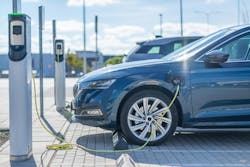Baltimore Mayor Signs Bill Requiring 100% Zero Emissions Vehicles by 2030 for City Administrative Fleet
Baltimore Mayor Brandon M. Scott has signed City Council Bill 21-0159 into law to help facilitate the transition to zero emissions vehicles for the City's administrative fleet. Under the bill, all new vehicles introduced to the City's fleet – including sedans, small pickups, and SUVs – will be required to be zero-emissions vehicles, most likely all-electric, by 2030.
“Baltimore government has the chance to lead in transitioning away from fossil fuels and leaving a livable planet for our children and grandchildren,” said Councilman Mark Conway (District 4). “Passing this bill, and now having it signed into law, means a more modern, environmentally friendly fleet for city workers and a lower carbon footprint for city government.”
Balitmore's recent greenhouse gas analysis shows transportation emissions account for 23% of the City's greenhouse gas footprint. Reports from peer municipalities highlighted that there are significant long-term cost savings associated with having an all-electric administrative fleet due to lower fuel and operations costs.
The recent bill signing is an important action by the City government and the Department of General Services to reach the City's climate goals of being 100% carbon neutral by 2045.
The law does allow for some exemptions if the technology does not yet exist or the vehicles are cost-prohibitive. It will also require the Department of General Services to report annually on both the transition and the possibility for the heavy-duty fleet to begin transitioning to zero emissions as well.
“My administration knows the critical importance of ensuring our city is able to confront the climate crisis head-on and do everything in our power to ensure Baltimore is leading the way in sustainability and climate resilience,” said Mayor Brandon M. Scott. “Doing so requires us to look at the steps city government can take to change the way it operates, and work to modernize our systems to be more climate-conscious.”
Since the 2010s, Baltimore has established a history of piloting electric vehicles throughout its fleet operations as part of the Maryland Energy Administration's Smart Energy Communities Program. Recently, a Ford Mach-E was delivered to the City Comptroller's Office, and 19 additional electric vehicles are expected to be introduced this year to the Department of General Services Fleet Division.
About the Author
EnergyTech Staff
Rod Walton is head of content for EnergyTech.com. He has spent 17 years covering the energy industry as a newspaper and trade journalist.
Walton formerly was energy writer and business editor at the Tulsa World. Later, he spent six years covering the electricity power sector for Pennwell and Clarion Events. He joined Endeavor and EnergyTech in November 2021.
He can be reached at [email protected].
EnergyTech is focused on the mission critical and large-scale energy users and their sustainability and resiliency goals. These include the commercial and industrial sectors, as well as the military, universities, data centers and microgrids.
Many large-scale energy users such as Fortune 500 companies, and mission-critical users such as military bases, universities, healthcare facilities, public safety and data centers, shifting their energy priorities to reach net-zero carbon goals within the coming decades. These include plans for renewable energy power purchase agreements, but also on-site resiliency projects such as microgrids, combined heat and power, rooftop solar, energy storage, digitalization and building efficiency upgrades.
